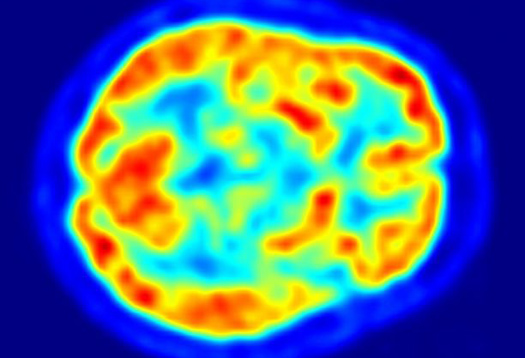
A study of the brain images of 124 cognitively normal, non-diabetic adults with a family history of Alzheimer’s disease showed a link between high blood sugar and reduced brain metabolism. (Credit: U. Arizona)
About 5 percent of men and women, ages 65 to 74, have Alzheimer’s disease, and it is estimated that nearly half of those age 85 and older may have the disease. Among known risks are age and genetics.
A new University of Arizona study, published in the journal Neurology, suggests a possible link between elevated blood sugar levels and risk for developing Alzheimer’s disease.
About 5 percent of men and women, ages 65 to 74, have Alzheimer’s disease, and it is estimated that nearly half of those age 85 and older may have the disease, according to the U.S. Centers for Disease Control and Prevention. Among the known factors that contribute to the disease are age and genetics. Scientists also think that high blood pressure, high cholesterol and diabetes may increase risk. [continue reading…]
Published: March 19, 2013

istockphoto
In addition, the study evaluated the contribution of individual common diseases to death using a nationally representative sample of older adults and found that dementia was the second largest contributor to death behind heart failure. Among 70-years-olds with Alzheimer’s disease, 61% are expected to die within a decade. Among 70-year-olds without Alzheimer’s, only 30% will die within a decade.
Alzheimer’s and dementia place an enormous burden on individuals and families. In 2012, there were more than 15 million caregivers who provided more than 17 billion hours of unpaid care valued at $216 billion. Individuals with dementia often require increasing levels of supervision and personal care as the disease progresses. As symptoms exacerbate as the disease progresses, the care required of family members and friends can often result in increased emotional stress and health challenges for caregivers. To learn more about the information released in Facts and Figures, visit alz.org to watch a video summarizing the report.
2013 Facts & Figures Facts and Figures also includes a special section focusing on the challenges faced by long-distance caregivers for people living with Alzheimer’s. The report finds that nearly 15% of caregivers for people with Alzheimer’s or another dementia are “long-distance caregivers” – caring for people with Alzheimer’s disease who live at least 1 hour away. These long-distance caregivers had annual out-of-pocket expenses nearly twice as high as local caregivers.
The Alzheimer’s Association provides a suite of free resources, programs and materials to assist individuals who live alone and their families, including:
Helpline: Available 24/7, this free call center (800.272.3900) offers information and support from master’s level clinicians.
The Alzheimer’s and Dementia Caregiver Center: From providing information about behaviors of those affected, to helping you find local support, our toolbox is available to help you answer even the complex questions.
ALZConnected: ALZConnected, powered by the Alzheimer’s Association, is a dedicated social networking community for anyone affected by Alzheimer’s disease; it provides a safe place for people to connect with others in similar situations 24 hours a day, 365 days a year at no charge.
For more information and resources to support those living alone with Alzheimer’s, visit the Alzheimer’s Association website at alz.org.
ᔥAlzheimer’s Association
Published: January 24, 2013

“This is the first time that researchers have been able to identify a brain process directly responsible for the beneficial effects of exercise in slowing down the progression of the early memory decline characteristics of Alzheimer’s disease,” says Marie-Christine Pardon. Image:Stockxpert
A stress hormone produced during moderate exercise may protect the brain from memory changes related to Alzheimer’s disease.
The findings, published in the Journal of Alzheimer’s Disease by researchers from the University of Nottingham, may also explain why people who are susceptible to stress are at more risk of developing the disease.
Increasingly there is evidence that physical and mental activity can reduce people’s chances of developing the disease or can slow down its progression but until now it has been unclear how this happens.
A research team, led by Marie-Christine Pardon in the School of Biomedical Sciences, discovered that the stress hormone CRF—or corticotrophin-releasing factor—may have a protective effect on the brain from the memory changes brought on by Alzheimer’s disease.
CRF is most associated with producing stress and is found in high levels in people experiencing some forms of anxiety and depressive diseases. Normal levels of CRF, however, are beneficial to the brain, keeping the mental faculties sharp and aiding the survival of nerve cells.
Studies have shown that people with Alzheimer’s disease have a reduced level of CRF.
Researchers used an experimental drug to prevent the hormone from binding to a brain receptor called CRFR1 in mice with Alzheimer’s disease that were free from memory impairments, therefore blocking the effects of the hormone.
They discovered that the mice had an abnormal stress response with reduced anxiety but increased behavioral inhibition when confronted by a stressful situation—in this case being placed in a new environment—and this is was due to the abnormal functioning of the CRFR1.
This abnormal stress response before the onset of symptoms may explain why people susceptible to stress are more at risk of developing Alzheimer’s.
Pardon and her team also found that interrupting the hormone from binding on to the CRFR1 receptor blocked the improvement of memory normally promoted by exercise. However, in mice with Alzheimer’s a repeated regime of moderate exercise restored the normal function of the CRF system allowing its memory enhancing effects.
The results are in line with the idea that regular exercise is a means of improving one’s ability to deal with everyday stress in addition to keeping mental abilities keen.
The switching on of this particular brain receptor during exercise increased the density of synapses, which makes the connection between nerve cells, the loss of which is thought to be responsible for the early memory loss seen in Alzheimer’s patients.
“This is the first time that researchers have been able to identify a brain process directly responsible for the beneficial effects of exercise in slowing down the progression of the early memory decline characteristics of Alzheimer’s disease,” says Pardon.
“Overall, this research provides further evidence that a healthy lifestyle involving exercise slows down the risk of Alzheimer’s disease and opens avenues for the new interventions targeting the altered CRFR1 function associated with the early stages of the disease.”
Research into Aging (Age UK) and the University of Nottingham funded the study.
 The text of this article by Futurity is licensed under a Creative Commons Attribution-No Derivatives License.
The text of this article by Futurity is licensed under a Creative Commons Attribution-No Derivatives License.
ᔥUniversity of Nottingham
Published: November 1, 2012
 Aspirin may help older women maintain brain function, a new study shows. of 700 women studied, 600 were considered to have a high risk of disease and stroke; about 20% took aspirin. Results showed the women taking aspirin had better brain function and that the benefits were more pronounced in those that did so for five years or longer. While preliminary results are encouraging, the exact relationship between brain function and aspirin are not known. The study needs to be replicated, and researchers also cautioned people taking aspirin solely to protect brain function. Aspirin can cause stomach ulcers or internal bleeding especially among people who take it regularly.
Aspirin may help older women maintain brain function, a new study shows. of 700 women studied, 600 were considered to have a high risk of disease and stroke; about 20% took aspirin. Results showed the women taking aspirin had better brain function and that the benefits were more pronounced in those that did so for five years or longer. While preliminary results are encouraging, the exact relationship between brain function and aspirin are not known. The study needs to be replicated, and researchers also cautioned people taking aspirin solely to protect brain function. Aspirin can cause stomach ulcers or internal bleeding especially among people who take it regularly.
ᔥAlzheimers Association




